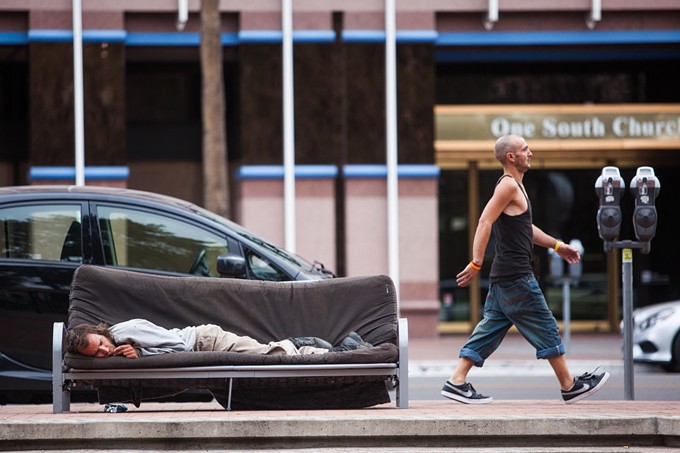UA employee charley Dejolie recently recorded—and posted on YouTube—a video of an altercation between three Downtown Tucson Partnership security guards and two homeless men.
On the evening of Saturday, Sept. 19, Dejolie and his girlfriend were on their way to watch the Borderlands' play about the Mexican-American studies ban, Más, when they were interrupted by a screaming match across the street.
The two homeless men were resting on the sidewalks surrounding the Arizona Theater Company, across the street from the Temple of Music and Art. It got so loud, several other people stopped to witnesses what was going on. A passerby tried to intervene, and told the security guards that what they were doing was harassment. But he was told to keep walking, or he'd be "put away," too. (The security guards were equally as aggressive to others who tried to get involved, Dejolie says.)
"If I get another call about you tonight, I'm placing you in handcuffs ... until [Tucson Police Department] gets here and have you go to jail," one of the security guards says in the video. Apparently, the two homeless men had been in the area earlier and were probably intoxicated, according to the Downtown Tucson Partnership. "... that is why you are not even [allowed] on the reservation, because of the way you are," another security tells one of the men, who is Native American.
"I don't bother nobody ... I take care of my friend," he says. His friend's leg is amputated. The security guard replies, "... not on their property. Like we told you earlier, [Arizona Theater Company] does not want you here."
After close to 10 minutes, Dejolie and his girlfriend kept moving, unsure and concerned for what happened to the two men. It was clear to them that the situation wasn't as bad as it could have been because the security guards noticed the couple filmed most of the incident.
"When you start making statements ... 'You got kicked off the reservation and they won't take you back,' that is the part that really pissed me off," says Dejolie, who was born and grew up on a Native American reservation in northern Arizona.
Dejolie was homeless for a bit in Phoenix, and he also understands what it means to find land "that becomes your territory. If you enter someone else's territory, you may get your ass kicked. These individuals that continuously end up in that corner ... that is their territory. They [may not be able] to venture out," he says.
During the following days, the couple sent email after email to Downtown Tucson Partnership CEO Michael Keith, other partnership staff, as well as ATC employees, expressing how disturbed they were and demanding the security men be fired. They weren't, but according to DTP Director of Operations Brandi Haga-Blackman, the partnership launched an internal investigation.
"If you continue to think it is necessary to have a private security force, at the very least they should be trained in how to interact with the public in a way that de-escalates situations, not makes them worse," one of Dejolie's emails says.
In DTP's defense, Haga-Blackman says in a response that on that Saturday DTP received two separate calls from the ATC demanding the two homeless men be removed from the property, because they were reportedly harassing staff and public walking by.
The men left after the first complaint, but returned later that day. About the guard who referenced the homeless man being kicked out of his reservation, Haga-Blackman and Keith explain that the DTP security guard who said that is also Native American and knows the homeless man personally.
Dejolie sees no value in justifications.
To him, it's about so many of Tucson's homeless continuously being devalued and criminalized over addiction, mental health and, oftentimes, simply for living on the streets. He doesn't understand how, or when, sidewalks were deemed private property and unusable to people who have nowhere else to go.
Hoping for a Better Response
This incident aside, DTP CEO Michael Keith believes the partnership's security force has been very helpful in alleviating the tension between downtown merchants and the community's homeless population—frustrations that built up since the days of so-called Safe Park, a community of houseless residents who once occupied Veinte de Agosto Park.
Keith and Haga-Blackman point out that many of the security guards have developed relationships with the area's homeless people, and are often protective. "One [man] tried to launch himself off a five-story parking garage, if it hadn't been for our security guards reaching out and catching his ankle, he would have fallen," Keith says. "It is an ever-changing landscape for our guys. Every time I watch them, their calm demeanor ... different people require a different approach."
Social worker and homeless advocate Michele Ream hasn't heard many complaints against DTP security. In fact, she remembers a recent experience when one of the guards brought a homeless man to a shelter in the hopes the man could get help in applying for an ID and other services.
Still, Ream doesn't think it should be a security guard's responsibility to handle a population that often struggles with mental health and other sensitive issues.
"The security guards don't have resources available to them ... basically no training or support, there is no agency working with them ... there is no coordinated effort between [homeless outreach] agencies and downtown," she says. In an ideal scenario, it would be best to pair up DTP security guards with social workers who are equipped to deal with different crises.
Haga-Blackman says DTP security gets mental health training once a year, as well as first-aid and CPR courses.
As of now, according to Haga-Blackman, the only partnership that exists with DTP security is with the Tucson Police Department, which, in the eyes of many social workers like Ream is unacceptable.
The security guards receive training from Tucson police, and have the green light from the Arizona Department of Public Safety to carry handcuffs and Mace. As Keith describes, their job is to be the "eyes and ears" of Tucson Police, and, when necessary, TPD is called to the scene. Both entities handle disruptions with "grace, compassion and professionalism," Haga-Blackman says in an email.
But Dejolie wonders what happens when there are no other people around, except for a security guard, or cop, and a homeless individual.
"There is no compassion for your fellow human beings anymore," Dejolie says. "If I can help my brothers, my sisters, as long as I don't jeopardize my own safety, I want to do something."











